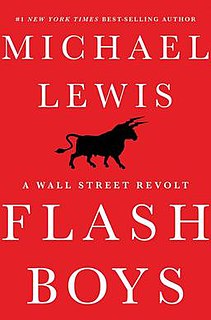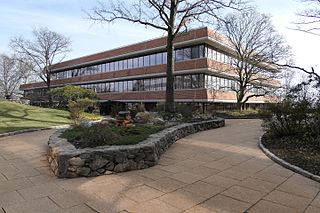IEX is an alternate stock exchange founded by Brad Katsuyama
IEX may also refer to:
- Irish Enterprise Exchange, see List of European stock exchanges
- Internet Explorer 10, a web browser from Microsoft
- Ion exchange
IEX is an alternate stock exchange founded by Brad Katsuyama
IEX may also refer to:

NYSE American, formerly known as the American Stock Exchange (AMEX), and more recently as NYSE MKT, is an American stock exchange situated in New York City. AMEX was previously a mutual organization, owned by its members. Until 1953, it was known as the New York Curb Exchange.
BSE may refer to:

The New York Stock Exchange is an American stock exchange in the Financial District of Lower Manhattan in New York City. It is by far the world's largest stock exchange by market capitalization of its listed companies at US$30.1 trillion as of February 2018. The average daily trading value was approximately US$169 billion in 2013. The NYSE trading floor is at the New York Stock Exchange Building on 11 Wall Street and 18 Broad Street and is a National Historic Landmark. An additional trading room, at 30 Broad Street, was closed in February 2007.

A stock exchange, securities exchange, or bourse is an exchange where stockbrokers and traders can buy and sell securities, such as shares of stock, bonds, and other financial instruments. Stock exchanges may also provide facilities for the issue and redemption of such securities and instruments and capital events including the payment of income and dividends. Securities traded on a stock exchange include stock issued by listed companies, unit trusts, derivatives, pooled investment products and bonds. Stock exchanges often function as "continuous auction" markets with buyers and sellers consummating transactions via open outcry at a central location such as the floor of the exchange or by using an electronic trading platform.

A stock market, equity market, or share market is the aggregation of buyers and sellers of stocks, which represent ownership claims on businesses; these may include securities listed on a public stock exchange, as well as stock that is only traded privately, such as shares of private companies which are sold to investors through equity crowdfunding platforms. Investment in the stock market is most often done via stockbrokerages and electronic trading platforms. Investment is usually made with an investment strategy in mind.

In finance, a warrant is a security that entitles the holder to buy the underlying stock of the issuing company at a fixed price called exercise price until the expiry date.
Katsuyama may refer to:

Oslo Stock Exchange is a stock exchange within the Nordic countries and offers Norway’s only regulated markets for securities trading today. The stock exchange offers a full product range including equities, derivatives and fixed income instruments.

William Henry Donaldson was the 27th Chairman of the U.S. Securities and Exchange Commission (SEC), serving from February 2003 to June 2005. He served as Under Secretary of State for International Security Affairs in the Nixon Administration, as a special adviser to Vice President Nelson Rockefeller, Chairman and CEO of the New York Stock Exchange, and Chairman, President and CEO of Aetna. Donaldson founded Donaldson, Lufkin & Jenrette.

Thomas Peterffy is a Hungarian-born American billionaire businessman. He is the founder, chairman, and the largest shareholder of Interactive Brokers. Peterffy worked as an architectural draftsman after emigrating to the US, and later became a computer programmer. In 1977, he purchased a seat on the American Stock Exchange and played a role in developing the first electronic trading platform for securities. According to Forbes he is the richest Hungarian, and the richest person in Florida.
Financial Technologies (India) Limited (FTIL) is an Indian financial services company, formed in 1988. It was funded by Jignesh Shah. The company offers technology intellectual property to create and trade on financial markets. The company commenced operations in 1988 starting off with the development of technology products for connecting financial markets. It had its first IPO in 1995. The company introduced its first commodity derivatives trading platform, the Multi Commodity Exchange (MCX) in 2003. It established similar exchanges in India and elsewhere. FTIL has divested of its domestic and international ventures.
High-frequency trading (HFT) is a type of algorithmic financial trading characterized by high speeds, high turnover rates, and high order-to-trade ratios that leverages high-frequency financial data and electronic trading tools. While there is no single definition of HFT, among its key attributes are highly sophisticated algorithms, co-location, and very short-term investment horizons. HFT can be viewed as a primary form of algorithmic trading in finance. Specifically, it is the use of sophisticated technological tools and computer algorithms to rapidly trade securities. HFT uses proprietary trading strategies carried out by computers to move in and out of positions in seconds or fractions of a second.
The Indian Energy Exchange (IEX) is an Indian electronic system based power trading exchange regulated by the Central Electricity Regulatory Commission (CERC). IEX started its operations on June 27, 2008. Indian Energy Exchange pioneered the development of power trading in India and provides an electronic platform to the various participants in powe market, comprising State Electricity Boards, Power producers, Power Traders and Open Access Consumers.
Elixir is a functional, concurrent, general-purpose programming language that runs on the BEAM virtual machine used to implement the Erlang programming language. Elixir builds on top of Erlang and shares the same abstractions for building distributed, fault-tolerant applications. Elixir also provides productive tooling and an extensible design. The latter is supported by compile-time metaprogramming with macros and polymorphism via protocols.

Flash Boys: A Wall Street Revolt is a book by the American writer Michael Lewis, published by W. W. Norton & Company on March 31, 2014. The book is a non-fiction investigation into the phenomenon of high-frequency trading (HFT) in the US financial market, with the author interviewing and collecting the experiences of several individuals working on Wall Street. Lewis concludes that HFT is used as a method to front run orders placed by investors. He goes further to suggest that broad technological changes and unethical trading practices have transformed the U.S. stock market from "the world's most public, most democratic, financial market" into a "rigged" market.

Investors Exchange (IEX) is a stock exchange based in the United States. It was founded in 2012 with the explicit mission to inspire fairness and innovation by creating technology that levels the playing field. IEX was launched as a national securities exchange in September 2016. On October 24, 2017, IEX received regulatory approval from the SEC to list companies. IEX listed its first public company, Interactive Brokers, on October 5, 2018. The exchange said that companies would be able to list for free for the first five years, before a flat annual rate of $50,000. On September 23, 2019 it announced it was exiting its listing business.
Bradley Katsuyama is a Canadian financial services executive. He is the CEO and co-founder of the IEX, the Investors Exchange. He left RBC in 2012 to co-found IEX under the premise that it would be a fairer stock trading venue than other exchanges.

Ronan Ryan is an Irish-American businessperson. He is the president of IEX, the Investor's Exchange, and an electronic trading expert. As a founding member of IEX, Ryan was a central character featured in Michael Lewis’ Flash Boys: A Wall Street Revolt. Irish America magazine named Ryan to its 2014 and 2015 Wall Street 50 list.

Interactive Brokers LLC (IB) is an American multinational brokerage firm. It operates the largest electronic trading platform in the U.S. by number of daily average revenue trades. The company brokers stocks, options, futures, EFPs, futures options, forex, bonds, and funds.